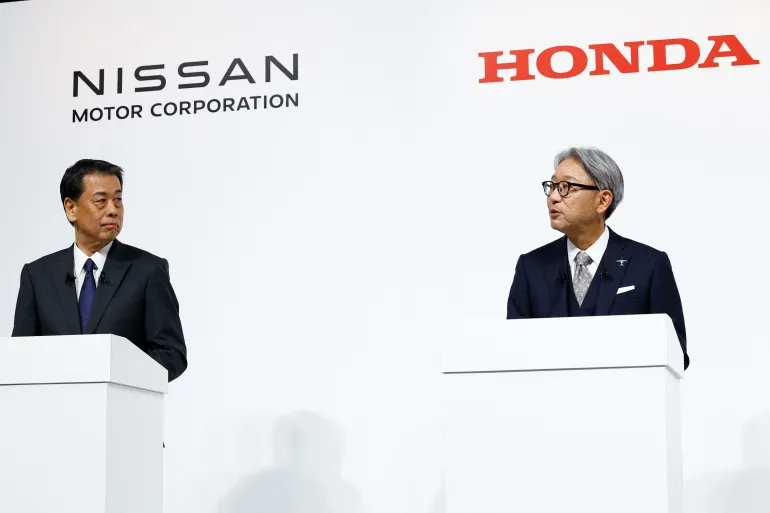By Adeyemi Adekunle
Japan’s Honda and Nissan have announced plans to merge, a decision that could reshape the global automotive industry. The merger, set to be finalized by August 2026, would create the world’s third-largest carmaker, following Toyota and Volkswagen.
At a joint press conference in Tokyo on December 23, 2024, Honda President Toshihiro Mibe and Nissan President Makoto Uchid signed a memorandum of understanding, signaling their commitment to the ambitious partnership.
The merger will also include Mitsubishi Motors, a smaller member of Nissan’s alliance, creating a powerhouse valued at over $50 billion.
Honda, currently valued at $40 billion and Japan’s second-largest automaker, is poised to take the lead in managing the new entity. Mibe expressed optimism about the partnership, describing it as a pivotal step toward strengthening their position in the rapidly evolving automotive sector.
“This merger is a response to the challenges and opportunities of the transition to sustainable energy. Together, we can achieve more than we ever could individually,” Mibe stated.
The merger comes as the automotive industry undergoes a seismic shift, moving away from fossil fuels toward electric and alternative energy vehicles. By combining resources and expertise, Honda and Nissan aim to enhance their competitive edge in this fast-changing landscape.
However, the merger has not been without controversy. Former Nissan Chairman Carlos Ghosn, who fled to Lebanon in 2019 after facing charges of fraud and misuse of company assets, criticized the plan as a “desperate move.”
Speaking via video call, Ghosn claimed that Nissan’s struggles were a direct result of poor leadership and internal discord following his departure.
Nissan has faced significant challenges in recent years. In November, the company announced a 9,000-job reduction—6 percent of its global workforce—and a 20 percent cut in global production capacity after reporting a quarterly loss of 9.3 billion yen ($60 million).
The merger with Honda is seen by many analysts as a lifeline for Nissan, providing a path to recovery and stability.
For Honda, the partnership represents an opportunity to expand its market influence and accelerate its shift toward electric vehicles.
The company has already established itself as a leader in the Japanese automotive market and sees the merger as a chance to further strengthen its global footprint.
The newly formed conglomerate will likely focus on joint development of electric vehicle platforms, shared manufacturing facilities, and research into autonomous driving technologies.
By pooling resources, the companies aim to reduce costs, increase efficiency, and improve their ability to compete against industry giants.
While the merger holds great promise, it also presents challenges. Analysts have noted potential hurdles in aligning corporate cultures and integrating operations across the three automakers.
Additionally, global economic uncertainties and fluctuating market conditions could impact the success of the partnership.
Despite these challenges, the announcement marks a significant moment for the automotive industry.




